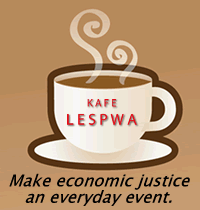 The Columbus Catholic Worker is in a period of deep discernment right now. At our last open community meeting, we felt great relief in the decision to throw ourselves into prayer. It was the one light in what has been otherwise a sea of grey murkiness. We couldn’t see the path, but we knew our next step.
The Columbus Catholic Worker is in a period of deep discernment right now. At our last open community meeting, we felt great relief in the decision to throw ourselves into prayer. It was the one light in what has been otherwise a sea of grey murkiness. We couldn’t see the path, but we knew our next step.In light of this:
Please join us at 9 am on Saturday morning this week (Nov 28) for a time of community prayer.
We are quite pleased to welcome our friend Tom, who will be leading us in a meditation on the Lord's Prayer. Tom is a beloved member of St. Joseph's Catholic Worker House in Rochester, NY (the Rochester CW began in 1935 and was one of the first branches of the movement).
The main theme of this prayer is discernment. Before we can negotiate with the Church the new terms of our lease, we must first come to a decision as a community about who we are and what we are all about. What are the non-negotiables? Must we do overnight hospitality or can we fulfill our mission by providing the many and varied programs that we currently have? Are we willing to become a 501C3 nonprofit in order to do this?
The Catholic Worker movement is known for its adaptability to circumstances. This has been a building year for the community, and we were willing to try new things as we stretched out and formed ourselves as a community. Now that we have a foundation, we can reach for the stars. But what stars do we want to reach for?
We plan to hold our own prayer times, put together a prayer schedule, as well as encourage everyone to participate in the ongoing prayer life of the Church at Mass, Eucharistic Adoration, or any other Church service. We welcome everyone to join us in this! At Saturday's prayer, we hope to develop a schedule and ask people to join us at various times of the day for prayer--you could join us in person or from your own home.
Our group began with the guidance of the Holy Spirit and we hope and trust that we will continue to see where the hand of God may be leading us.
ALSO: The next Open Community Meeting will be Sunday, December 13th at 4:00 pm. We will continue our discussion of our present and future discernment. In particular, we will be looking at whether becoming a 501C3 non-profit makes sense.
We are reserving the 2nd Sunday of each month for the meetings. Your presence, prayer and presents are very much needed!








